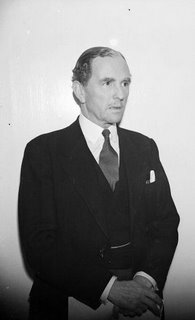Suez
 The next few weeks sees the 50th anniversary of the so-called Suez Crisis in the Middle East. Commentators are keen to draw parallels between that and the war in Iraq; there are many, although I suspect the Labour leader of 50 years ago, Hugh Gaitskell, would have been appalled by Tony Blair's actions as a future leader of the party he famously said he would 'fight, fight and fight again' to save. The Suez debacle also precipitated the retirement of James Stuart as Scottish Secretary.
The next few weeks sees the 50th anniversary of the so-called Suez Crisis in the Middle East. Commentators are keen to draw parallels between that and the war in Iraq; there are many, although I suspect the Labour leader of 50 years ago, Hugh Gaitskell, would have been appalled by Tony Blair's actions as a future leader of the party he famously said he would 'fight, fight and fight again' to save. The Suez debacle also precipitated the retirement of James Stuart as Scottish Secretary.Stuart was actually absent when Sir Anthony Eden told the Cabinet he was resigning, and his stand-in Lord Strathclyde ‘was told to get Mr Stuart down as quickly as possible because his opinion would be required’. Ironically, the Scottish Secretary had actually backed Eden over Suez until he announced, under overwhelming international pressure, that British and French forces were to be withdrawn from Egypt. ‘I did not object to our going IN,’ Stuart recalled. ‘What I did object to was our coming OUT.’ He told Eden this in plain terms, saying that troops could have reached the canal without any trouble, but Stuart accepted that Eden’s decision was irreversible. ‘It did, however, break my political heart,’ he said, ‘and I was glad when it became possible for me to quit the Government in the following year. I had lost interest and was tired.’
Stuart’s relationship with Eden had always been ambivalent, Churchill’s successor having never shown much interest in Scotland, and he saw the prime minister’s ignominious climb-down as a good excuse to retire.
[James Stuart, Within the Fringe, 177]

0 Comments:
Post a Comment
<< Home